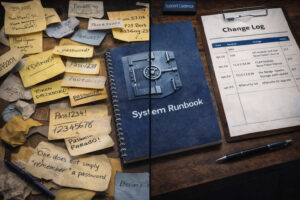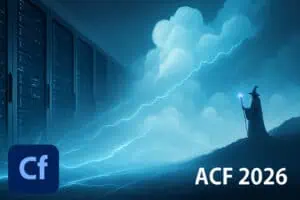Most CEOs focus on reputation, valuation, and growth. A legacy ColdFusion security posture shapes all three. Governance and lifecycle discipline drive the outcome. The upshot? Surprise costs, slower deals, and tense board questions. You can see the risk in premiums, diligence findings, and incident exposure. Breach risk has become brand risk A decade ago, a […]
TeraTech ColdFusion Blog
CIOs: Is Your ColdFusion App Security Audit-Defensible?
If an external auditor arrived tomorrow, could you, as the CIO, explain your ColdFusion security posture clearly, with evidence and without scrambling? Boards and CEOs want documented controls. Cyber insurers raise the bar during underwriting. Regulators look for proof, not context. A single high-risk finding can turn into an awkward conversation with the CEO, fast. […]
From CF Crash Fire Fighting to Predictability: A CIO’s Guide to Stabilizing ColdFusion Systems
For many CIOs, ColdFusion incidents aren’t just technical problems. They’re 3am phone calls. Board meeting explanations. The reason you can’t take a vacation. They’re firefighting. They are high-stress moments that invite scrutiny, disrupt operations, and quietly erode confidence. Every incident raises the same questions: Why did this happen? Why now? And how do we prevent […]
5 Questions CEOs Should Ask Their IT Team About ColdFusion Risk
ColdFusion crash issues rarely announce themselves clearly. For CEOs, the challenge isn’t fixing technical problems. It is knowing whether a business-critical system is quietly putting the company at risk. The questions below help leadership teams surface that risk without needing to become technical experts. Explore Our ColdFusion Crash Service 1. Downtime Exposure If this […]
Adobe ColdFusion 2026: The Definitive Guide for Modern CIOs
Navigating enterprise technology decisions, particularly when considering platform upgrades like Adobe ColdFusion, demands clarity and foresight. Navigating enterprise technology decisions, especially when contemplating platform upgrades like Adobe ColdFusion, requires clarity and foresight. For CIOs managing ColdFusion, the pivotal question is whether it’s time to upgrade or modernize their platform. Adobe ColdFusion 2026 presents a solution, […]
Adobe ColdFusion Online Summit
ContentsAdobe ColdFusion Online Summit 2026When is it?Where is it?CostsWhy AttendJoin from anywhereAgendaSpeakers Adobe ColdFusion Online Summit 2026 Join us January 26–29, 2026 for a fully online learning experience designed for developers and teams building modern, high-performance web applications with Adobe ColdFusion. By attending, you’ll gain insights into:• New capabilities in the latest CF release that […]
State of the CF Union 2025 Survey Released
State of the CF Union 2025 Survey Released! Help us find out the state of the CF Union – what versions of CFML Engine do people use, what frameworks, tools etc.
The Legacy Continues: ColdFusion Summit East Conference Edition
ContentsAdobe ColdFusion Summit East 2026: Event DetailsAdobe ColdFusion Summit East 2025: Ultimate Developer Conference GuideAdobe ColdFusion Summit East 2025: Event Details and Registration InformationColdFusion Summit East 2025 Location and Venue DetailsAdobe Certified Professional ColdFusion Workshop 2025: Complete Training ProgramColdFusion Summit East 2025 Conference Agenda and Technical SessionsColdFusion Summit East 2025 Expert Speakers and Industry LeadersFrequently […]
Lucee 6: A New Era for CFML Development
In the web development realm, where the quest for efficiency and power unfolds like an epic journey through Middle-earth, a new champion has emerged. Lucee 6, the first major update to the platform since 2016, is akin to the light of Eärendil guiding developers through the darkness and promises to lead CFML developers to victory, […]
Adobe ColdFusion 2025: The Path to Modernization
Adobe ColdFusion, a top choice for developers and organizations, continues to thrive in the ever-evolving digital landscape. Released in February 2025, Adobe ColdFusion 2025 introduces exciting features and enhancements, making it an enticing upgrade option. Adobe ColdFusion 2025 Pricing Adobe ColdFusion 2025 Pricing: A Shift in Licensing Model This release signifies a substantial change in […]







